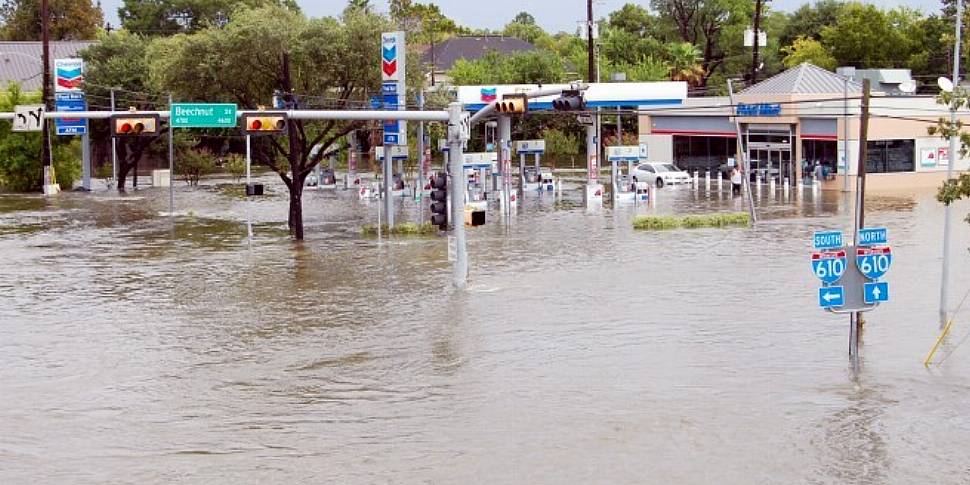People trapped by rising floodwaters in Texas have been told to stand on their roofs and wait for rescue as emergency services deal with thousands of desperate calls for help.
Waters have reached as high as second-storey homes as the deluge from storm Harvey dumps tens of inches of rain on the state.
"This event is unprecedented & all impacts are unknown & beyond anything experienced," tweeted the National Weather Service.
Areas south of Houston - America's fourth-biggest city - appear most at risk after they received around four inches (10cm) of rain an hour.
Parts of the city had more than 30in (76cm) of rain in 48 hours, with more expected, according to the National Weather Service.
Two people are confirmed to have died so far - including a woman who tried to get out of her car in high water in Harris County - although the Houston Chronicle was reporting that six people had died.
Texas Governor Greg Abbott said conditions were "bad and growing worse" as National Guard troops were deployed to the city overnight.
He said damage was in "the billions of dollars" and there had been 1,000 water rescues.
Fifty children were among those rescued from two apartment blocks in Houston's Greenspoint neighbourhood.
Dozens of boats and five Coast Guard helicopters have been helping pluck people to safety, while dump trucks and city buses moved Houston residents to higher ground.
The city's main public hospital - Ben Taub - is to be evacuated after a busted sewer pipe forced officials to close the kitchen, but the evacuation cannot begin because the building is surrounded by waist-deep water.
Police were using Twitter to field calls for help from people trapped in houses and cars.
Houston 911 received more than 56,000 calls between 10pm on Saturday and 1pm Sunday, according to the city's Office of Emergency Management. The city usually gets about 8,000 calls on an average day.
Sky's Siobhan Robbins, in Rosenberg - 40 minutes from Houston, said many areas are under mandatory evacuation orders.
"Emergency lines are at breaking point," she said.
"The police have actually said ‘do not ring 911 unless you are basically about to die, unless you are under life-threatening conditions.’”
Many residents were left with a choice between braving the flooded roads and staying in their houses, which may also be flooded.
For those braving the roads, petrol prices shot up more than 6% to their highest level in more than two years. At least 2 million barrels per day of oil refining capacity was offline because of the storm.
People were told not to drive and, if staying in their homes, to get on the roof, rather than staying in the attic.
President Trump said "major rescue operations" are under way, and tweeted: "Wow - Now experts are calling #Harvey a once in 500 year flood! We have an all out effort going, and going well!"
He initially said he would visit the state “as that trip can be made without causing disruption,” but it has since been confirmed that he will visit on Tuesday.
In the small island community of Port Aransas, officials also said there was "massive" damage.
"I can tell you I have a very bad feeling and that's about it," said Mayor Charles Bujan, who admitted he was not sure how many people had taken notice of an order to evacuate.
The mayor of Rockport said the coastal city had been hit "right on the nose" by hurricane-force winds, with roads strewn with downed trees, and telephone poles and trailer park homes were ripped apart.
Harvey, which brought 130mph winds when it first hit land as a hurricane on Friday, has now weakened to 45mph.
The rain is expected to last through to the middle of next week.









